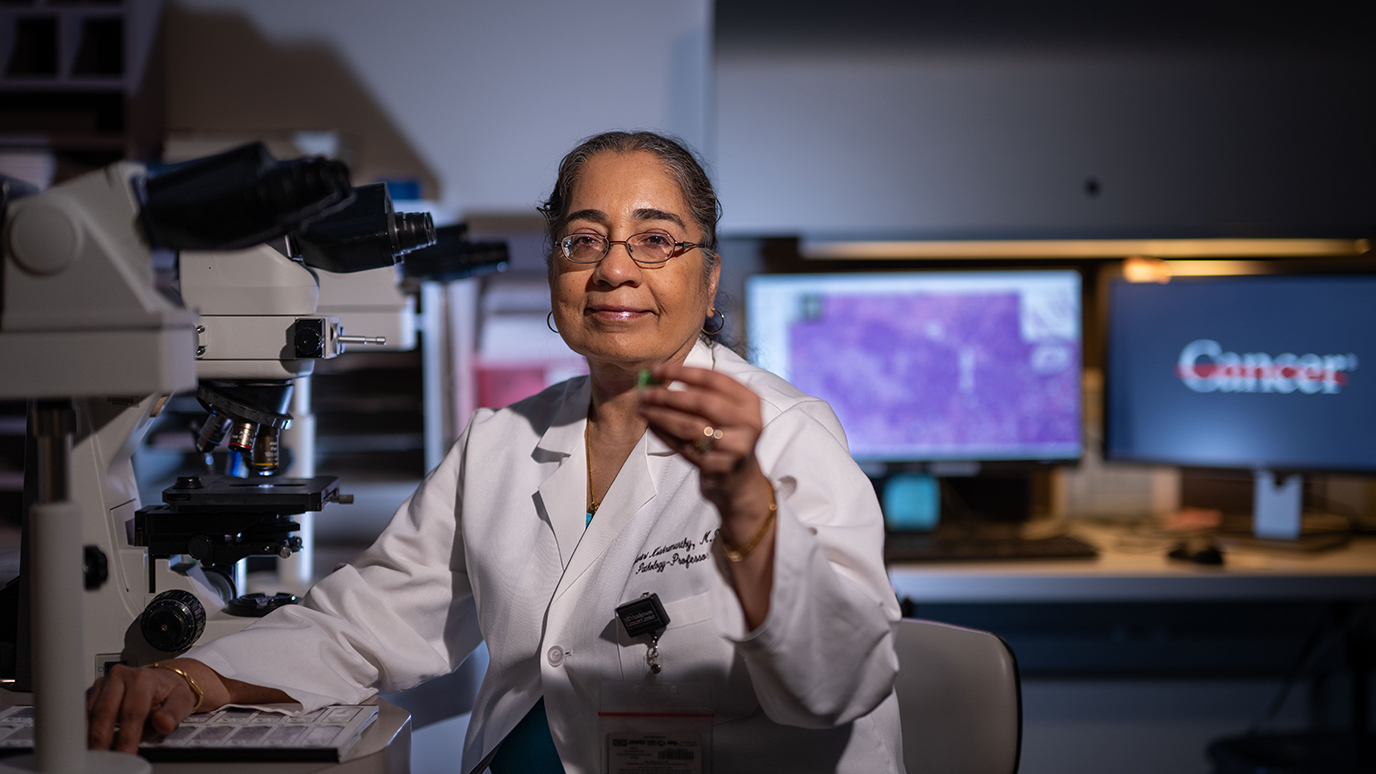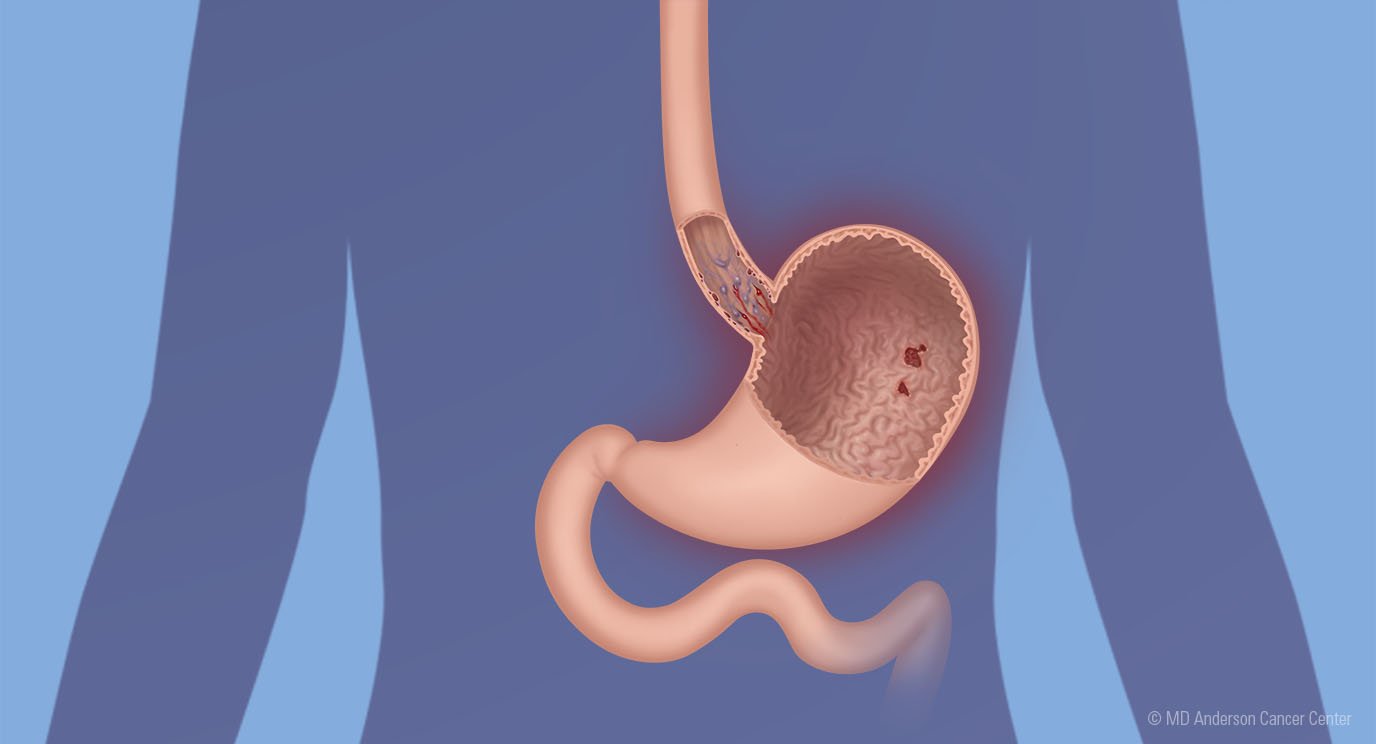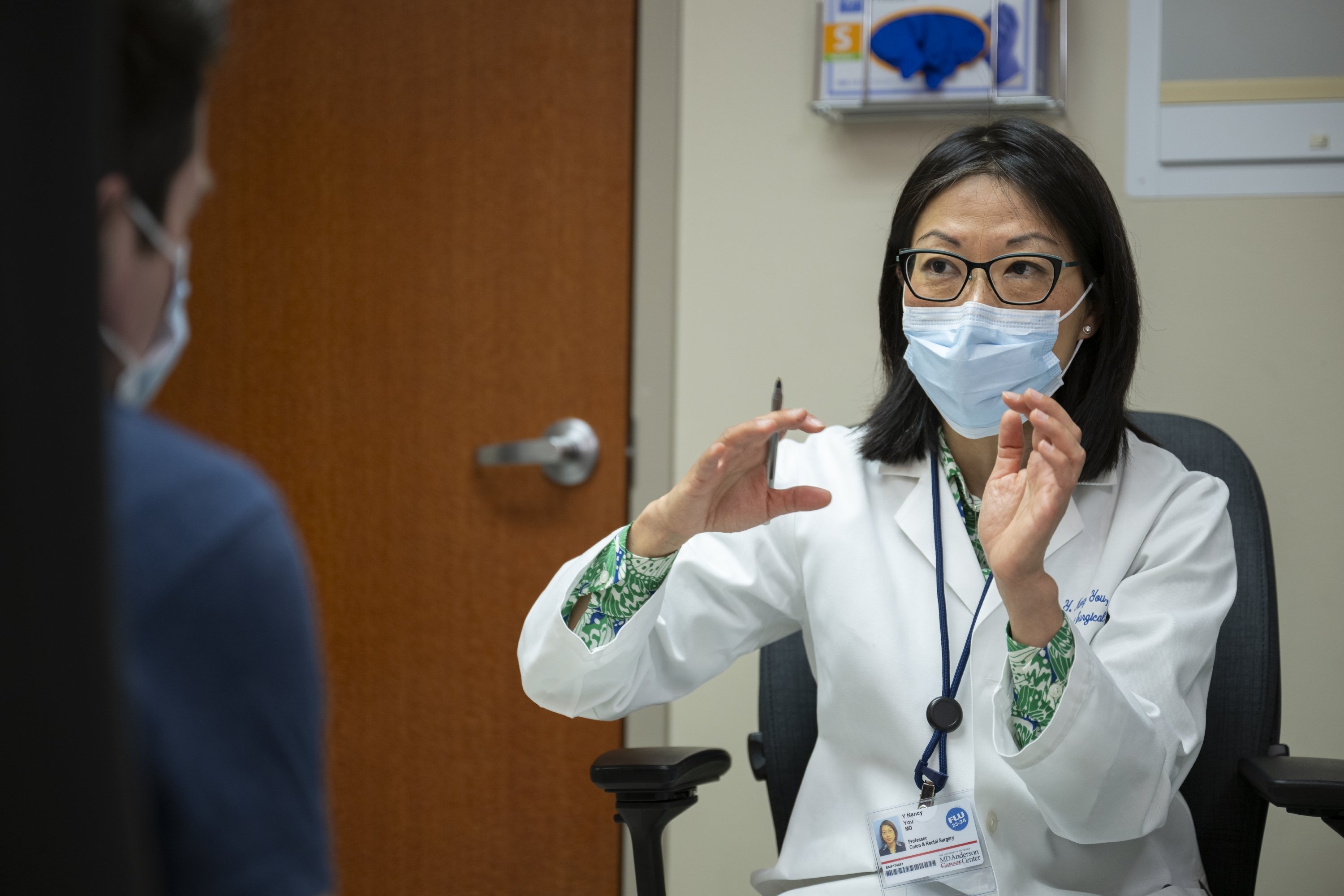- Diseases
- Acoustic Neuroma (14)
- Adrenal Gland Tumor (24)
- Anal Cancer (68)
- Anemia (2)
- Appendix Cancer (16)
- Bile Duct Cancer (26)
- Bladder Cancer (72)
- Brain Metastases (28)
- Brain Tumor (232)
- Breast Cancer (714)
- Breast Implant-Associated Anaplastic Large Cell Lymphoma (2)
- Cancer of Unknown Primary (4)
- Carcinoid Tumor (8)
- Cervical Cancer (158)
- Colon Cancer (166)
- Colorectal Cancer (116)
- Endocrine Tumor (4)
- Esophageal Cancer (44)
- Eye Cancer (36)
- Fallopian Tube Cancer (8)
- Germ Cell Tumor (4)
- Gestational Trophoblastic Disease (2)
- Head and Neck Cancer (12)
- Kidney Cancer (128)
- Leukemia (342)
- Liver Cancer (50)
- Lung Cancer (286)
- Lymphoma (278)
- Mesothelioma (14)
- Metastasis (30)
- Multiple Myeloma (100)
- Myelodysplastic Syndrome (60)
- Myeloproliferative Neoplasm (4)
- Neuroendocrine Tumors (16)
- Oral Cancer (100)
- Ovarian Cancer (172)
- Pancreatic Cancer (160)
- Parathyroid Disease (2)
- Penile Cancer (14)
- Pituitary Tumor (6)
- Prostate Cancer (146)
- Rectal Cancer (58)
- Renal Medullary Carcinoma (6)
- Salivary Gland Cancer (14)
- Sarcoma (238)
- Skin Cancer (296)
- Skull Base Tumors (56)
- Spinal Tumor (12)
- Stomach Cancer (64)
- Testicular Cancer (28)
- Throat Cancer (92)
- Thymoma (6)
- Thyroid Cancer (96)
- Tonsil Cancer (30)
- Uterine Cancer (80)
- Vaginal Cancer (16)
- Vulvar Cancer (20)
- Cancer Topic
- Adolescent and Young Adult Cancer Issues (20)
- Advance Care Planning (10)
- Biostatistics (2)
- Blood Donation (18)
- Bone Health (8)
- COVID-19 (362)
- Cancer Recurrence (120)
- Childhood Cancer Issues (120)
- Clinical Trials (630)
- Complementary Integrative Medicine (22)
- Cytogenetics (2)
- DNA Methylation (4)
- Diagnosis (232)
- Epigenetics (6)
- Fertility (62)
- Follow-up Guidelines (2)
- Health Disparities (14)
- Hereditary Cancer Syndromes (126)
- Immunology (18)
- Li-Fraumeni Syndrome (8)
- Mental Health (116)
- Molecular Diagnostics (8)
- Pain Management (62)
- Palliative Care (8)
- Pathology (10)
- Physical Therapy (18)
- Pregnancy (18)
- Prevention (914)
- Research (392)
- Second Opinion (74)
- Sexuality (16)
- Side Effects (604)
- Sleep Disorders (10)
- Stem Cell Transplantation Cellular Therapy (216)
- Support (402)
- Survivorship (320)
- Symptoms (182)
- Treatment (1786)
Navigating cancer as a young adult: Going away to college
5 minute read | Published July 07, 2023
Medically Reviewed | Last reviewed by an MD Anderson Cancer Center medical professional on July 07, 2023
Dealing with cancer as a teenager or young adult living at home can be difficult, but what happens when you go away to college? Whether you plan on attending college out of town or even out of state, it’s important to make your physical and mental health a priority.
We spoke with Wendy Griffith, program manager for our Adolescent and Young Adult (AYA) Program, who shared tips to help young adult cancer patients heading to college.
Anticipate your living situation
Many colleges have adopted more modern living spaces for undergraduates, so make sure your living situation fits your lifestyle. Start by asking the following questions:
- Where am I going to live?
- Who will I be living with?
- Is it a big community setting, like a dorm, or a smaller apartment?
Answering these questions will help you determine the community infection risk in different situations, like if your roommate gets sick or the flu spreads throughout your dorm. Some cancer patients are at increased risk for infections or may face a greater risk of complications from communicable diseases like COVID-19 and the flu. So, it’s important to choose a living situation that provides the level of protection you need.
Establish medical care
Identify what medical care you’ll need while you’re away at college and figure out whom to contact if you need to see a doctor while you’re at school. This will depend on whether you’re actively in treatment, on maintenance therapy or finished with treatment.
“A lot of college students use a student health plan, which is fine,” says Griffith. “But it’s important to find a doctor within your university’s medical system that’s willing to see you, prescribe medications and work with your oncologists back home, if necessary.”
Be sure to find out which emergency room is closest and/or best to visit in case of an emergency, and confirm that it’s covered by your insurance.
Make sure your class schedule is manageable
Nobody knows your body better than you, so consider how many classes you can realistically take each semester. Don’t overload your schedule, especially in the beginning.
“You have to know your threshold and what you can handle in taking classes,” says Griffith. “If you’re concerned with workload, we recommend cutting down to nine or even six hours.”
The time of day of your classes is also important. For example, if you find it difficult to get out of bed until noon, avoid registering for morning classes.
“Do you want to go to class and then have a gap where you can take a nap before heading to your next class?” says Griffith. “Or are you going to do better by knocking out all your classes back to back and then having the remainder of the day to rest?”
There may also be opportunities to attend some classes virtually. Check with your professors to see what your options are.
Request classroom accommodations
Some cancers and cancer treatments can impact your ability to learn, think or physically move from place to place. Those can be considered disabilities, and federal law requires post-secondary schools to offer accommodations for students with disabilities.
“We strongly encourage patients to ask for any accommodations they think they might need,” says Griffith. “To do this, contact your school’s disability services office.”
If you’re a patient at MD Anderson, you can ask for an AYA consult to speak with a vocational counselor who can help determine which accommodations you should ask for. These can include:
- additional time to take tests
- alternative test formats (e.g., written instead of oral)
- copies of class notes
- leaving early or arriving late to class
“When requesting accommodations, be sure to follow the specific protocols,” says Griffith. “Don’t just OK it with your professor and assume they’ll hold up their end of the bargain. Make sure you have a formal agreement with the school.”
Share your cancer diagnosis with friends when you’re ready
College will introduce you to many new people, which can seem intimidating if you’re trying to forge friendships while dealing with cancer.
But remember, there’s no right time to tell people you have cancer. The most important thing is to do it whenever you feel comfortable.
“I know patients who just get it out the way and tell everybody right off the bat because they say they only want friends who can handle it,” says Griffith. “They tell people, ‘I’m putting all my energy into going to school and dealing with cancer. I don’t have the energy to tiptoe around people’s feelings about my cancer.’”
Griffith says those patients see it as an automatic filter – anyone getting past that point is becoming your friend because they truly want to.
But not everyone is comfortable sharing that information so soon.
“Some students don’t want to be identified by their cancer, so they wait until they get to know someone and have built a solid relationship,” says Griffith.
The challenge then becomes the balancing act of sharing too early versus sharing too late.
“If you’re going to regular doctor’s appointments, getting chemotherapy infusions and having scans, but not telling this to the friend that you see every week, it can feel like a betrayal to that friend when they find out,” says Griffith. “No one’s wrong in this situation – your friend’s entitled to their feelings and you’re allowed to keep certain things private.”
As friendships grow, so does the trust between those individuals.
“If you decide to wait to share, use that time to think about exactly how and what you’ll want to share when the time is right,” says Griffith. “And set your boundaries. You could try saying, ‘I’m sharing this with you, but please don’t tell anyone else. I don’t need a GoFundMe or anything like that. And it doesn’t need to change anything in our relationship.’”
Consider giving specific ways they can support you and be clear about what you want from the friendship going forward.
Bottom line? Going away to college can be difficult for young adults with cancer. But with preparation and clear communication, Griffith stresses, you can make it a truly enjoyable experience.
“The AYA program is here for you,” she says. “Our patients can reach out to us every step of the way for help navigating life at college.”
Request an appointment at MD Anderson online or by calling 1-877-916-0457.

We strongly encourage patients to ask for any accommodations they think they might need.
Wendy Griffith
Program Manager, Adolescent and Young Adult Program





